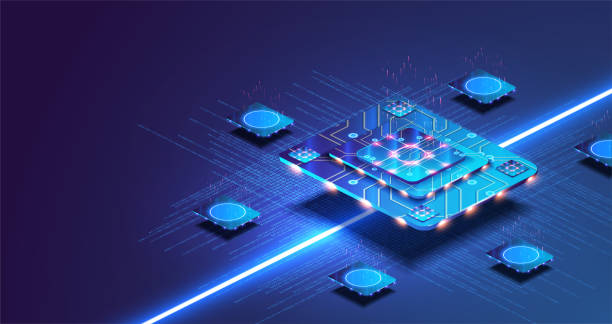Quantum computing is set to revolutionize the world of technology by fundamentally changing how computations are performed. Unlike classical computers, which use bits as the basic unit of information, quantum computers use quantum bits, or qubits, to leverage the principles of quantum mechanics. This article explores the principles of quantum computing, its potential applications, benefits, challenges, and future prospects.

Understanding Quantum Computing
Quantum Computing is a type of computation that utilizes quantum-mechanical phenomena such as superposition and entanglement to process information in fundamentally different ways from classical computers. Key concepts include:
- Qubits: Unlike classical bits, which represent information as either a 0 or a 1, qubits can represent both 0 and 1 simultaneously due to superposition. This property allows quantum computers to perform many calculations at once.
- Superposition: Superposition is a fundamental principle of quantum mechanics where a quantum system can be in multiple states at the same time. In quantum computing, this means qubits can exist in multiple states simultaneously, exponentially increasing the computational power.
- Entanglement: Entanglement is a quantum phenomenon where qubits become interconnected in such a way that the state of one qubit instantaneously affects the state of another, regardless of distance. This property enables quantum computers to process complex information more efficiently.
- Quantum Gates: Quantum gates are the building blocks of quantum circuits, analogous to classical logic gates. They manipulate qubits through operations that change their state, enabling quantum algorithms to perform complex calculations.
- Quantum Algorithms: Quantum algorithms leverage the principles of quantum mechanics to solve problems more efficiently than classical algorithms. Notable examples include Shor’s algorithm for factoring large numbers and Grover’s algorithm for searching unsorted databases.
Applications of Quantum Computing
- Cryptography: Quantum computing has the potential to break traditional cryptographic systems by efficiently solving problems that classical computers struggle with. For example, Shor’s algorithm could factor large integers, undermining the security of RSA encryption. Conversely, quantum computing also paves the way for quantum cryptography, which uses quantum principles to create unbreakable encryption methods.
- Drug Discovery and Material Science: Quantum computers can simulate molecular structures and chemical reactions with high accuracy, significantly accelerating drug discovery and the development of new materials. This capability could lead to breakthroughs in medicine and materials science by enabling more precise modeling of complex systems.
- Optimization Problems: Quantum computing excels at solving optimization problems that are computationally infeasible for classical computers. This includes applications in logistics, financial modeling, and supply chain management, where finding optimal solutions can lead to substantial cost savings and efficiency improvements.
- Artificial Intelligence (AI) and Machine Learning (ML): Quantum computing has the potential to enhance AI and ML by processing large datasets more quickly and efficiently. Quantum algorithms could improve pattern recognition, optimize training processes, and enable more sophisticated models.
- Climate Modeling: Accurate climate modeling requires vast amounts of computational power to simulate complex interactions within the Earth’s climate system. Quantum computing can provide more accurate and efficient simulations, aiding in climate research and policy-making.

Benefits of Quantum Computing
- Exponential Speedup: Quantum computers can solve certain problems exponentially faster than classical computers. This speedup has the potential to revolutionize fields that rely on complex calculations and large datasets.
- Enhanced Problem-Solving Capabilities: Quantum computing can tackle problems that are currently intractable for classical computers. This capability opens up new possibilities for solving complex scientific, industrial, and commercial problems.
- Improved Simulation Accuracy: Quantum computers can simulate physical systems with high accuracy, enabling better predictions and insights in fields such as chemistry, physics, and material science.
- Advancement of AI and ML: Quantum computing can advance AI and ML by improving computational efficiency and enabling the development of more powerful algorithms and models.
- Potential for Breakthrough Discoveries: The unique capabilities of quantum computing could lead to groundbreaking discoveries in various fields, including medicine, materials science, and cryptography.
Challenges in Quantum Computing
- Technical Complexity: Building and maintaining a quantum computer is technically challenging due to the delicate nature of qubits, which require extremely low temperatures and precise control. Quantum systems are highly susceptible to errors and decoherence.
- Error Correction: Quantum computers are prone to errors due to noise and interference. Developing effective quantum error correction techniques is crucial for ensuring reliable and accurate computations.
- Scalability: Scaling quantum computers to a large number of qubits while maintaining coherence and control is a significant challenge. Current quantum computers have limited qubit counts, which restricts their practical applications.
- Cost and Resources: Quantum computing research and development are resource-intensive, requiring substantial investment in specialized equipment, infrastructure, and expertise. The high cost of quantum technology can be a barrier to widespread adoption.
- Cryptographic Implications: The potential to break existing cryptographic systems raises concerns about data security and privacy. Developing new cryptographic methods resistant to quantum attacks is essential to address these challenges.
Future Trends in Quantum Computing
- Quantum Supremacy: Quantum supremacy refers to the point at which a quantum computer performs a calculation that is beyond the reach of classical computers. Achieving quantum supremacy is a major milestone that will demonstrate the practical potential of quantum computing.
- Quantum Cloud Computing: Quantum cloud computing allows users to access quantum computing resources over the internet. This approach enables broader access to quantum technology and facilitates collaboration among researchers and developers.
- Hybrid Quantum-Classical Systems: Hybrid systems that combine quantum and classical computing will likely play a crucial role in leveraging the strengths of both technologies. These systems can address complex problems by using quantum computing for specific tasks and classical computing for others.
- Quantum Networking: Quantum networking aims to develop communication networks that leverage quantum principles for secure data transmission. This includes quantum key distribution (QKD) and other techniques for achieving secure and private communication.
- Commercialization and Industry Adoption: As quantum technology matures, it will become more commercially viable and adopted across various industries. Quantum computing will likely drive innovation and transformation in fields such as finance, healthcare, and logistics.

Conclusion
Quantum computing represents a paradigm shift in computational technology, offering the potential for exponential speedup and solving problems that are currently beyond the capabilities of classical computers. With applications spanning cryptography, drug discovery, optimization, and AI, quantum computing promises to drive significant advancements across various fields. While challenges related to technical complexity, error correction, and scalability remain, ongoing research and development are paving the way for a future where quantum computing becomes an integral part of technological progress. As quantum technology continues to evolve, it will unlock new possibilities and shape the future of computing in profound ways.

